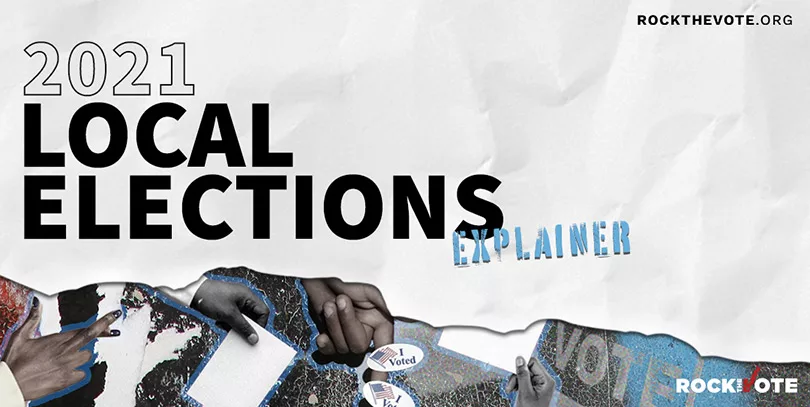
What are local or municipal elections?
Every year is an election year! Even when there aren’t national or statewide elections, local elections are happening across the country. These elections determine local leaders and make decisions on issues that impact our communities — from school board members to funding for law enforcement to mask mandates.
When are my local elections?
The timing of local elections varies greatly, but they often happen in odd numbered years, like 2021. Many of the most populated cities and counties in the country are holding elections on Tuesday, November 2. 2021. Find out if local elections are happening in your city/county here.
What offices are elected locally?
In city/county elections, voters are usually deciding on a variety of positions that influence all aspects of our daily lives:
– Executives like mayors and county executives;
– Legislative offices, such as city council members and county commissioners who make the laws or ordinances for the local community;
– Positions have a lot of influence over the justice system, including judges, district attorneys, court clerks, coroners, and sheriffs;
– County and citywide positions, such as treasurers and city and county clerks who often act as the local election official; and
– Neighborhood positions, like school board members who have influence over our schools.
Voters may also vote on community issues that often have budget implications. At the local level, ballot measures are often called referendums, charters, or millages.
Why is voting in local elections so important?
Even though the federal elections receive more attention, the daily lives of Americans are often most deeply impacted by their state and local officials.
State and local elections play an outsized role in shaping our daily lives and the communities we call home, particularly in crucially important issues like housing, civil rights, education, criminal justice reform, minimum wage, and policing.
Who tends to vote in local elections?
Local governments are generally not representative of their constituencies, meaning they often do not reflect the demographic composition of their citizens.
Despite the importance of local elections, voter turnout is often abysmally low in local elections. A recent study of mayoral elections found that fewer than 15% of eligible voters cast their ballot for mayor in 10 of America’s 30 largest cities.
What’s more, the few voters who do turn up to vote are less representative of the population. This means small, non-representative groups of Americans are making outsized decisions about issues like education, housing, criminal justice, policing, and minimum wage.
Are there any state elections happening in 2021?
There are some statewide elections happening. The states of New Jersey and Virginia have statewide elections on November 2, 2021. In addition, some states have statewide elections on very specific positions/ballot measures. For example, Texas has 8 statewide ballot measures to determine on Tuesday, November 2 and there’s a special primary election for the U.S. Congress in the 20th Congressional District in Florida. Every year is election year!
I moved since the last election and didn’t update my voter registration. Can I still vote in my state/local election in 2021?
Some states offer the ability to register to vote when an individual votes in person either on Election Day or during the early vote period — this is called same-day registration because a voter is registering on the same day they are voting. Check Rock the Vote’s state-by-state guide to find out if your state offers same-day voter registration.
What can I do if I do not have any local elections in my area?
Be sure to double check your area is holding elections in 2021. If not, reach out to friends and family in areas with local elections to make sure they have the information they need to cast their ballot. Sign up for alerts for elections in your area.
Published December 8, 2021
